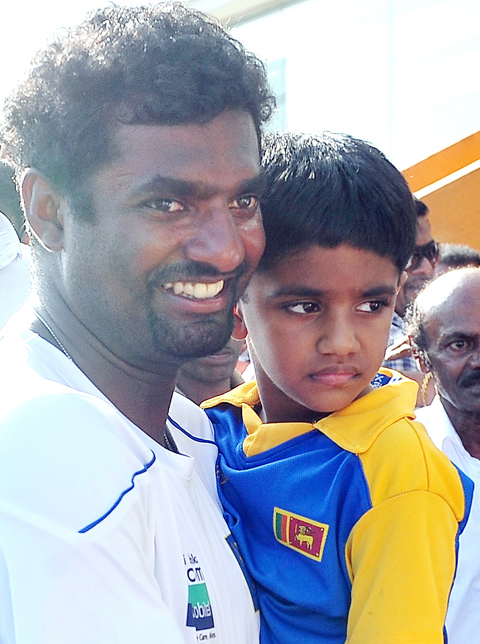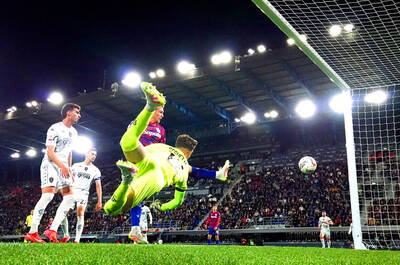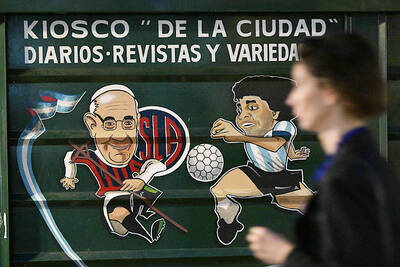Decades ago, in that faraway post-war world before live sports commentaries were routine, a small boy in Yorkshire, England, would search frenziedly through the ether for radio stations that might cracklingly reveal news of how England’s cricketers were faring on the other side of the world in contests against Australia.
On Thursday morning, I was that same little boy again, desperately channel-hopping for cricket scores, this time in search of news of the astonishing never-see-his-like-again phenomenon that is Muttiah Muralitharan.
Would the guileful Sri Lankan bowler — the greatest Asian sportsman of all time, perhaps — cap his final game by dismissing an unprecedented, still almost unbelievable, 800th Test match victim?

PHOTO: AFP
For the many who neither know nor care about such things, but who are sufficiently motivated to read on, it may be helpful to understand that only two other bowlers in addition to Muralitharan have ever dismissed more than 600 batsmen and that in nearly a century and a half of trying, no Englishman has ever exceeded 383.
That’s how much in his own league Murali is.
In mid-morning came the inevitable confirmation that he had done it.
Murali is simply the best, but don’t take my word for it. Take the word of someone who played against him many times without ever fully mastering Murali’s array of skills.
Batting against him, wrote Steve Waugh, the combative former Australia captain, was the ultimate challenge, “enticing, then withdrawing, probing before striking, each delivery a mini-battle.”
Murali possesses a very even temperament, Waugh says, but like all great artists in any field “he is also focused and driven, always looking to extend his repertoire.”
In the end, Waugh concludes: “One can only marvel at his unsurpassed record.”
There is, however, something beyond the record. Put aside, for a moment, the poignantly appropriate fact that Murali completed his career yesterday on the cricket field at Galle, that was swamped by the 2004 tsunami for whose victims he has worked so tirelessly ever since. Put aside, too, the remarkable truth that in a nation, and in a national team, dominated by the majority Sinhalese population during a period of brutal ethnic civil war, this nonpareil player is from the minority Tamil population. Put aside, for that matter, the fact that not one of Rupert Murdoch’s many TV channels, happy to carry any amount of live darts and minor league soccer, could be bothered to broadcast yesterday’s milestone moment live.
Instead consider this.
Amid the overpaid egos and pampered brats who populate so much of contemporary sport, Muralitharan seems to stand almost completely apart, the proverbial good deed in what often feels like an ever naughtier sporting world of drugs, bribes and cheating.
With achievements like his on the cricket field, and amid the apparently unconditional adulation of his divided nation, Muralitharan could so easily have become the worst kind of petulant sporting diva. There are many precedents. Nor, after suffering so many insults to, and insinuations about, his bowling action for so long, would it have been any surprise if he had evolved into one of sport’s most self-pitying, embittered crazy guys.
On the contrary, as far as one can see, Murali has managed to combine being one of the handful of genuine sporting legends with a calm demeanor, a warm personality and an ability to see his achievements in a healthy perspective.
Having completed his amazing feat, Murali told interviewers yesterday that he was more concerned to be remembered as a nice person than as an often unplayable spin bowler.
It is impossible not to contrast both Murali’s goodness and his sustained success — he had to capture eight wickets, no mean challenge, in his final game to reach 800 — with the record and demeanor of England’s over-hyped soccer players with their six-figure weekly wages and lack of basic skills and success.
Murali is a lesson to others too.
Last weekend at St Andrews, Tiger Woods battled his way around The Open course in the wind and rain, playing neither particularly well nor badly, but looking more miserable than a multimillionaire sports star has any right to look. Over the years, I have seen Woods play several times and I daresay I would never have gone to watch golf in the first place if it hadn’t been for his all-round appeal. I once even wrote — confession time — an article about Tiger as the perfect American, a man who embodied with almost laboratory precision the combination of ability, hard work, ethnic mix, glamor and success that make a lot of Americans feel good about themselves.
Oh, what a fall there was.
Do not forget, though, that before he self-destructed, Woods had an on-course allure that only a handful of sports stars, or stars of any kind, could command. When you saw him approaching down the fairway, it was thrilling, like waiting for Domingo to sing. The aesthetic of his play and his demeanor were mesmerizing. His ability to do something truly brilliant was unrivaled.
Over the years, Woods honed all these talents into the most gloriously intimidating aura that the sports world could offer, certainly unprecedented in golf. In modern times, only Federer’s command of tennis stands comparison.
At St Andrews, however, it was obvious that Woods has lost it. The aura is gone. He is just another fine player, struggling to keep up, a bit like Lance Armstrong in this year’s Tour de France, although unlike Armstrong it is possible that Woods may manage to put most of it back together again one day.
The sports world will always crave faster, stronger and higher. Sporting heroes, though, are transient at best and have feet of clay at worst — in sport as in other things, certainly politics.
Even Federer has begun to lose and even Muhammad Ali lost too. Anyone who has put their faith in sporting princes over the years knows how regularly they turn out to be unworthy of the worship that we lavish on them. The day Fred Trueman told the Yorkshire Evening Post he always voted Conservative was a particularly hard one for me. Perhaps, as Enoch Powell said of political careers, all sporting careers end in failure too.
If that is true, then how to explain the amazing Murali?
His career ends in triumph not failure, in acclaim not disdain, as a legend not as a loser.
Unhappy the land that needs heroes, says Brecht sternly, but perhaps his preceding line — unhappy the land that lacks heroes — is actually truer after all.
Idols do not have to fall, like Woods. They can also be worthy, like Murali. Or perhaps I have fallen for the, er, spin.

Bologna on Thursday advanced past Empoli to reach their first Coppa Italia final in more than half a century. Thijs Dallinga’s 87th-minute header earned Bologna a 2-1 win and his side advanced 5-1 on aggregate. Giovanni Fabbian opened the scoring for Bologna with a header seven minutes in. Then Viktor Kovalenko equalized for Empoli in the 30th minute by turning in a rebound to finish off a counterattack. Bologna won the first leg 3-0. In the May 14 final in Rome, Bologna are to face AC Milan, who eliminated city rivals Inter 4-1 on aggregate following a 3-0 win on Wednesday. Bologna last reached the

If the Wild finally break through and win their first playoff series in a decade, Minnesota’s top line likely will be the reason. They were all over the Golden Knights through the first two games of their NHL Western Conference quarter-finals series, which was 1-1 going back to Minnesota for Game 3 today. The Wild tied the series with a 5-2 win on Tuesday. Matt Boldy had three goals and an assist in the first two games, while Kirill Kaprizov produced two goals and three assists. Joel Eriksson Ek, who centers the line, has yet to get on the scoresheet. “I think the biggest

From a commemorative jersey to a stadium in his name, Argentine soccer organizers are planning a slew of tributes to their late “Captain” Pope Francis, eulogized as the ultimate team player. Tributes to the Argentine pontiff, a lifelong lover of the game, who died on Monday at the age of 88, have been peppered with soccer metaphors in his homeland. “Francisco. What a player,” the Argentine Football Federation (AFA) said, describing the first pope from Latin America and the southern hemisphere as a generational talent who “never hogged the ball” and who showed the world “the importance of having an Argentine captain,

Noelvi Marte on Sunday had seven RBIs and hit his first career grand slam with a drive off infielder Jorge Mateo, while Austin Wynn had a career-high six RBIs as the Cincinnati Reds scored their most runs in 26 years in a 24-2 rout of the Baltimore Orioles. Marte finished with five hits, including his eighth-inning homer off Mateo. Wynn hit a three-run homer in the ninth off catcher Gary Sanchez. Cincinnati scored its most runs since a 24-12 win against the Colorado Rockies on May 19, 1999, and finished with 25 hits. Baltimore allowed its most runs since a 30-3 loss to